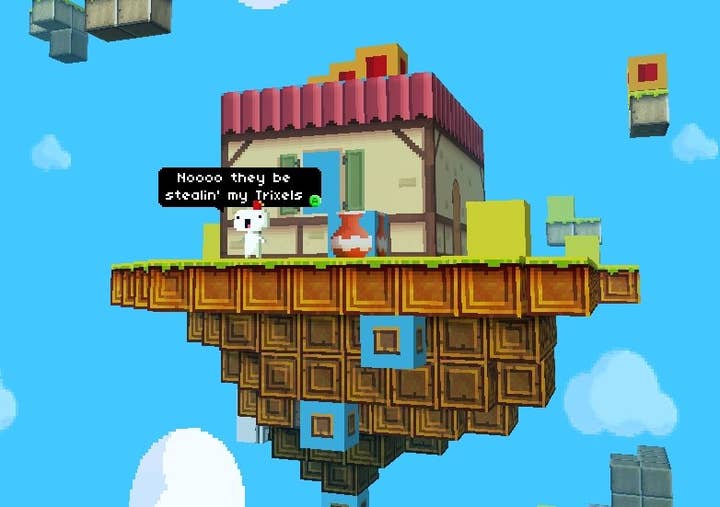Critical Consensus: Fez
Five years of hard work pays off in fine style in Polytron's inventive platformer
Describing an indie game developed by a team of four as "a labour of love" is somewhat trite, but it's difficult to think of a more suitable way to sum up Fez. The product of five years of gruelling work on the part of its creator, Phil Fish, Fez brims with smart ideas, endearing flourishes and affectionate nods to a slew of classic games. Both the labour and the love are all too apparent.
In terms of both the story behind its creation and the experience of actually playing, this is a very easy game to like, which is what virtually every critic in existence has done - even on hard-marking publications like Edge magazine, where its cheerful originality sends the reviewer into a fit of philosophical nostalgia.
"Polytron's long-delayed debut serves as a lavish reminder that, even after four decades of ceaseless iteration, videogames can still be mysterious.
"The chunky art might reference the glory years of 16bit consoles...but Fez's playful approach to design invokes the tricksterish temperaments of older games such as Jet Set Willy and Exile. This is a throwback to those idiosyncratic, often quietly bewildering titles made by a tiny group of designers and programmers, all going mad together in close quarters.

"It's a return to the days when nothing was too esoteric for inclusion, and there was no better use of production time than stuffing an entire campaign with in-jokes, secret rooms, codes, and hidden challenges."
But don't let the sunny exterior and general atmosphere of levity fool you: beneath all that bonhomie Fez is an impressive technical achievement, something that Joystiq's 9 out of 10 review goes out of its way to highlight.
"In the public eye, it may be impossible to separate Fez from its outspoken, indie-famous developer. When actually playing Fez, however, what stands out is its involving gameplay and gorgeous design, making it impossible to separate it from its programmer, Renaud Bedard.
"Bedard is a bit of a genius. He programmed Fez in what he calls 'trixels,' a 3D model similar to voxels but with more complicated properties, allowing them to appear as 2D, 8-bit 'triles' while retaining their 3D properties. Players control the shift between 2D and 3D with the trigger buttons, each time stopping on a plane that appears to be an HD remake of any 1980s platformer.
It's as if Shigeru Miyamoto had made his 2001: A Space Odyssey: a peaceable game of exploration, collection and riddling shot through with a trippy, 1970s flavour of surrealism
"The illusion is so effective that a few times I briefly forgot about the 3D shift option and attempted to play it as a strict platformer (a feat that is not possible, it should be noted). The 3D view change is seamlessly built into the worlds that Gomez, the little 2D dude with the fez hat, is tasked with exploring, and it is thrilling to watch the towers and floating islands transform with each new view."
Gamespot is similarly impressed by Fez's ingenious core mechanic, but its 8 out of 10 review offers a minor caveat: the variety of ways the game makes use of the 2D/3D transition is described as "a marvel", but ultimately the experience feels somewhat insubstantial.
"There's the underlying feeling that the main tool you use to manipulate the world is little more than a gimmick, a simple novelty, and this thought is cemented by the sheer ease of your adventuring. It takes only a bit of trial and error to clamber to new ground. So you peacefully climb ivy-covered walls and turn cranks, enjoying the sights without ever being fully engaged.
"That's not to say the platforming elements are poor. The first few hours introduce so many concepts that you don't have time to think about how simple it all feels. It's when the new ideas become commonplace that doubt creeps into your mind."
Eurogamer, however, has few doubts of any kind, awarding Fez a rare 10 out of 10 and drawing favourable comparisons to the very games that inspired Phil Fish to become a game designer in the first place. Not only does it evoke the same sense of wonder as Metroid, Zelda and other Nintendo classics, it's also good enough to stand proudly beside them.

"It's as if Shigeru Miyamoto had made his 2001: A Space Odyssey: a peaceable game of exploration, collection and riddling shot through with a trippy, 1970s flavour of surrealism. You'll unlock doors to forgotten cities. You'll discover warp routes and hidden worlds, and reach for a pad and pen to unscramble one of several secret languages scrawled on the walls (one is composed entirely of Tetris shapes).
"Most of all, you'll marvel at the twists and branches of an unravelling world map as you go deeper, higher, further still - losing yourself down one of Fez's dozens of rabbit holes that always last a few steps longer than you expected, or take you somewhere you didn't think you'd be. A floating bell tower, perhaps, or a treetop observatory, or a seedy, abandoned tenement outlined against a sky that flickers like a neon sign. Fall to your death, and you rematerialise straight away on the last safe platform. Fez has no interest in hindering your exploration of its magical locations.
"The simple joy of exploration is at the very heart of the appeal of video games. In Fez - which features no combat or enemies, and only the mildest kind of platforming peril - it's absolutely unfettered."

